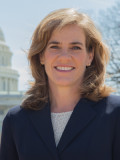By BJC General Counsel K. Hollyn Hollman
 Early in the oral arguments in Town of Greece v. Galloway, a case challenging Christian prayers at town board meetings, U.S. Supreme Court Justice Anthony Kennedy — often considered the Court’s “swing” vote — asked a central question: is prayer at government meetings simply a historical aberration notwithstanding the First Amendment’s Establishment Clause, or is it justified by some rational explanation?
Early in the oral arguments in Town of Greece v. Galloway, a case challenging Christian prayers at town board meetings, U.S. Supreme Court Justice Anthony Kennedy — often considered the Court’s “swing” vote — asked a central question: is prayer at government meetings simply a historical aberration notwithstanding the First Amendment’s Establishment Clause, or is it justified by some rational explanation?
That question has troubled church-state observers since the Court’s decision in Marsh v. Chambers (1983), in which it upheld the Nebraska Legislature’s practice of opening its official sessions with chaplain-led prayer. Marsh is the sole legal authority for similar practices in the U.S. Congress and other legislative arenas, and it is the basis on which attorneys for the Town of Greece relied in arguing that their clergy-led prayer practice is also permissible at local government meetings.
Attorneys for the town and for the United States, which supported the town’s position and shared the oral arguments, however, struggled to articulate a rationale for upholding prayers in a government forum that supplied any limiting principle. Marsh was unusual in that it did not apply typical Establishment Clause principles, instead comparing the state legislature’s chaplain-led prayer to Congress’ prayer tradition dating back to the founding era. As National Public Radio’s legal affairs correspondent Nina Totenberg put it, Marsh’s legacy — “how to reconcile a tradition of public prayers with the Constitution’s ban on establishment of religion” — is one that has “bedeviled [the Court] for decades.”
This struggle was readily apparent in the justices’ questioning from the bench during the Greece arguments. Justice Elena Kagan questioned whether the town’s practice fit with the widely shared understanding that our Constitution promises that we are equal citizens without regard to how we worship, observing that prayers like the ones in Greece “might be inconsistent with this understanding that when we relate to our government, we all do so as Americans, and not as Jews and not as Christians and not as nonbelievers.”
In response, the U.S. deputy solicitor general, arguing in support of the town, again emphasized the historical practice of prayer in Congress, noting that “from the First Continental Congress, and then from the … first Congress, there have been legislative prayers given in the religious idiom of either the official chaplain or a guest chaplain, that have regularly invoked the deity and the language of the prayer-giver.”
But University of Virginia law professor Doug Laycock, representing the two Greece citizens who challenged the town’s prayer practice, stressed that both context and content distinguish this case from the relevant facts in Marsh. In Greece, he argued, highly sectarian prayers were directed at citizens in a coercive setting. In order to be upheld as constitutional, according to Laycock, prayers at government meetings must be nonsectarian, in the Judeo-Christian tradition of the American civil religion. For several justices, the idea that prayers must be nonsectarian raised practical problems about how to formulate and enforce such a standard.
Justice Kagan lamented the difficulty of the case for the Court, noting that rules are certain to be perceived by some as hostile to religion. “Part of what we are trying to do here is to maintain a multi-religious society in a peaceful and harmonious way. And every time the Court gets involved in things like this, it seems to make the problem worse rather than better. What do you think?” Laycock maintained that parameters are needed and can be sustained. He said, “There are people who distort your decisions. There are people who misunderstand your decisions honestly and — and innocently. But keeping government neutral as between religions has not been a controversial proposition in this Court.”
After a series of questions about the practical way to allow prayer but protect against the mostly Christian prayer practice in Greece, Justice Kennedy expressed concern, “This involves government very heavily in religion.”
To that, Laycock pointed back to the Court: “Well, the government became very heavily involved in religion when we decided there could be prayers to open legislative sessions. Marsh is the source of government involvement in religion. And now the question is how to manage the problems that arise from that.”
Click here to listen to a podcast featuring Hollman and BJC Staff Counsel Nan Futrell discussing the BJC’s brief in the case.
From the November/December 2013 Report from the Capital. Click here for the next article.





